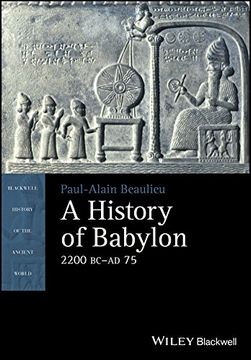A History of Babylon, 2200 bc - ad 75 (Blackwell History of the Ancient World) (en Inglés)
Reseña del libro "A History of Babylon, 2200 bc - ad 75 (Blackwell History of the Ancient World) (en Inglés)"
The aim of this project is to write a narrative history of Babylon from the time of its First Dynasty (1880-1595) until the last centuries of the city's existence during the Hellenistic and Parthian periods (ca. 331-75 AD). During most of its history, Babylon was the capital of a kingdom that corresponded roughly to the southern and central parts of Iraq, an area commonly designated as 'Babylonia', although this term did not come into widespread use until Babylon had lost its independence and become a province of the Persian and Seleucid empires. At other times Babylon's rule extended well beyond Babylonia, for instance during the second half of the 6th century, when the city was the capital of a vast empire stretching from the Persian Gulf to Cilicia and from Jerusalem to the confines of Armenia. During the second millennium Babylon had received, synthesized and transformed the heritage of the old civilization of Sumer and Akkad to become the main expression of Mesopotamian civilization. Babylon even wielded decisive cultural influence over Assyria, although the latter was often more powerful politically and militarily. Babylonian became the international language of culture and diplomacy during the Late Bronze, and in almost every capital of the Near East including Egypt an elite of scribes copied and studies classics of Babylonian literature and wrote official correspondence to other courts in the Middle Babylonian dialect. Although the cosmopolitan reach of Babylonian receded in the first millennium, the development of Babylonian science and scholarship ensured the continued influence of that civilization even after the loss of independence. As late as the second century BC, Greek astronomers like Hipparchus borrowed entire sets of data and parameters from their Babylonian colleagues. At the same time, however, Jewish thinkers were spreading the view, inherited from the prophets of the Biblical period, of Babylon as the emblematic city of imperial hubris, idolatry and corruption. This view entirely dominated the imagination of the Western and Islamic worlds until the 19th century, when the rediscovery of cuneiform documentation allowed historians to redress the balance and separate history from myth. Therefore, to write a History of Babylon means not only to write a history of the most important phase in the development of Mesopotamian culture, but also to understand how an ancient and complex civilization became memorialized for posterity as a purely theological symbol.

